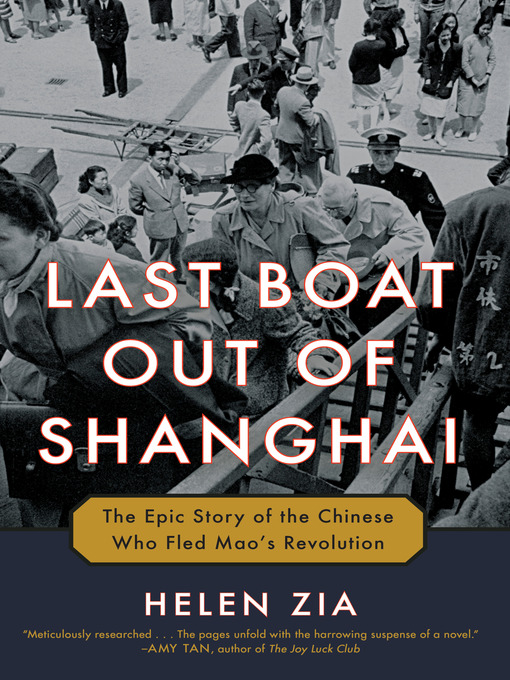
Last Boat Out of Shanghai
The Epic Story of the Chinese Who Fled Mao's Revolution
کتاب های مرتبط
- اطلاعات
- نقد و بررسی
- دیدگاه کاربران
نقد و بررسی

November 1, 2018
Stories of courage and resilience emerge from decades of oppression.On May 25, 1949, the People's Liberation Army marched into Shanghai, completing Mao's victorious takeover of China. Coinciding with the 70th anniversary of that revolution, Chinese-American journalist Zia (Asian American Dreams: The Emergence of an American People, 2000, etc.), former executive editor of Ms. magazine, vividly chronicles the lives of several individuals caught in the violent "tsunami of revolution" in China's "biggest, most glamorous, and most notorious city," the port where throngs of Chinese rushed to escape. In early May 1949, the World War II transport ship General Gordon was the last boat out of Shanghai, culminating an exodus that sent millions of Chinese to seek refuge throughout the world. In a narrative gleaned from more than 100 interviews, Zia focuses on four exiles whose stories represent "the voices, viewpoints, and character of the Shanghai diaspora." Benny Pan, who grew up in a sheltered enclave and was educated in private schools, had little knowledge of his father's political and financial machinations as an inspector with the British-controlled Shanghai Municipal Police. Ho Chow's family were landowning gentry who lived off rent from their tenant farmers. Bing Woo (the author's mother), given away by her poverty-stricken birth family, was adopted by one woman only to be passed on to another family. Annuo Liu was the daughter of an ardent Nationalist whose politics put the family in dire jeopardy. Zia begins her history in 1937, with the Japanese occupation of China that lasted until the end of World War II. While Benny's father collaborated with the Japanese and their puppet government, others suffered from martial law, strict censorship, and severe rationing of critical resources. After the war, the arrival of American soldiers and the ousting of Japanese soldiers and civilians augured stability, but a civil war between Nationalists and Communists led to more privations, an atmosphere of suspicion, and virulent repression. With captivating detail, the author reconstructs the tense "panic to flee" that engulfed the nation.An absorbing history of a refugee crisis that mirrors current events.
COPYRIGHT(2018) Kirkus Reviews, ALL RIGHTS RESERVED.

Journalist Zia (Asian American Dreams: The Emergence of an American People) writes a compelling history of five individuals and their families who escaped Shanghai during the Chinese Civil War (1946-50). The chapters alternate among accounts of Benny, Ho, Bing, Annuo, and Doreen, beginning when they were children on the eve of the Japanese invasion of China in the 1930s. The book concludes in the 1950s, when they are young adults scattered across the globe in Nanjing, Hong Kong, Taiwan, and the United States. They each come from very different backgrounds and either begin their lives in Shanghai or end up there during the course of World War II. After Japan's defeat, elation was replaced with fear as the civil war between the Nationalists and Communists resumed. When a Communist victory becomes certain, these families are forced to make difficult decisions about whether to leave the country. VERDICT The stories of these refugees offer a window into Chinese culture, family life, and the history of this tumultuous period, resulting in a beautiful and emotional work that should be essential reading for those interested in 20th-century Chinese history.--Joshua Wallace, Tarleton State Univ. Lib. Stephenville, TX
Copyright 1 Library Journal, LLC Used with permission.
December 1, 2018
Starting with the Japanese advancement on Shanghai in 1937, Zia (Asian American Dreams, 2000) chronicles the lives of four very different young people who spent the war in the Paris of the Orient and their subsequent exodus after the Communist's 1949 victory. The quartet stands in for the uncounted refugees created by the fall of the Nationalist government, highlighting the vast differences in motivations and experiences involved and shedding light on the depth and nuance that coverage of refugees needs but frequently lacks. Engaging and compelling, Zia tells the story of Benny, the pampered son of a notorious Japanese collaborator; Ho, the son of a rural landlord who lands in Shanghai after fleeing the Japanese and focuses on proving himself academically; Bing, the author's mother, who was given up by both her birth family and her adoptive one; and Annuo, the daughter of a domineering Nationalist official whose family is constantly on the move. Background research is seamlessly woven into the narratives, resulting in an illuminating and highly readable volume that will appeal to a wide range of readers.(Reprinted with permission of Booklist, copyright 2018, American Library Association.)

























دیدگاه کاربران